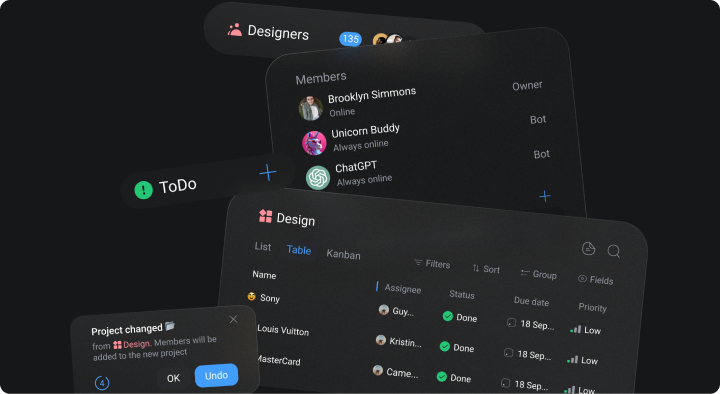Team Management Tips for Startup Success
Leading a startup's team means doing it swiftly. To do so, you not only need to be aware of project management techniques but also have the proper tools at hand. Find the best ones for your needs.
Managing resources, tracking progress, and maintaining communication can feel like a juggling act for small and medium teams. But with the right strategies and tools, even small teams can achieve great success.
In this article, we'll explore the secrets to successful project management for small and medium-sized teams, offering insights, tips, and showcasing how certain tools can transform the way you work.
Getting the value of management for teams
Project management isn't just about creating Gantt charts and setting deadlines — it's about steering the team towards success by ensuring that tasks are completed on time, within budget, and to the desired quality standards. For small and medium teams, the stakes are even higher. With limited resources and often less manpower, optimizing every aspect of the project becomes critical.
Small and medium teams face challenges such as
- Resource constraints (limited budget, time, or personnel).
- Role fluidity (team members may take on multiple roles).
- Communication breakdowns (especially in remote or hybrid settings).
- Managing multiple projects simultaneously.
Power of planning
The key to success is in the planning — this mantra holds true for teams of any size. For small and medium teams, effective planning ensures that no time or resources are wasted.
How to plan effectively
- Set clear goals. Every project should begin with a well-defined goal. What are you aiming to achieve? What does success look like?
- Break down tasks. Divide the project into manageable tasks or milestones. This makes the work more achievable and provides the team a clear path forward.
- Define roles. Even in small teams where people wear multiple hats, it's crucial to assign roles clearly. Know who is responsible for what.
Task assignment and role management
In small and medium teams, it's common for its members to handle multiple responsibilities. However, to prevent burnout and ensure productivity, it's essential to assign roles effectively.
How to manage tasks and roles
- Use a central hub. Rather than juggling between multiple apps for task management and communication, use a platform like Orchestra, where everything happens in one place.
- Make roles and responsibilities visible. Everyone on the team should know who is responsible for what. In Orchestra, tasks are assigned to individuals, and their progress is transparent to the whole team.
- Track workload. Ensure no one is overloaded by using built-in tools that monitor the distribution of tasks.
Monitoring progress and adapting to changes
In project management, flexibility is key. Projects rarely go as planned, and the ability to monitor progress and adapt quickly to changes can mean the difference between success and failure.
The best ways to monitor progress
- Regular check-ins. Use tools like Orchestra's task customizable boards to ensure everyone stays on track. Visual boards and progress charts make it easy to see where bottlenecks might occur.
- Real-time updates. With Orchestra, your team receives real-time updates, so any changes in the project are instantly communicated. This reduces the risk of miscommunication and ensures that everyone is on the same page.
- Flexibility in task management. As priorities shift, Orchestra allows you to easily reassign tasks or adjust deadlines without losing track of what's been accomplished so far.
Clear communication equals team success
Communication breakdown is one of the most common reasons projects fail. In small teams, where every team member's contribution is critical, ensuring transparent, efficient communication is essential.
Keys to effective communication
- Regular updates. Daily or weekly stand-ups can help the team stay aligned.
- Using the right tools. While messaging apps are great, integrating communication into your project management tool eliminates the risk of messages being lost or overlooked. Orchestra's integrated messaging and video conferencing tools ensure your communication stays directly linked to tasks and projects.

How Orchestra help startups succeed
Small and medium-sized teams don't have the luxury of large departments or extensive resources, but with the right project management tool, they can work just as efficiently and effectively as larger organizations.
Explore the app's best solutions
- All-in-one space. No need to juggle multiple tools. Manage tasks, communicate, and track progress all in one place.
- Customization features. Tailor Orchestra to fit your team's unique workflows, whether you're managing SEO campaigns or game development projects.
- Real-time collaboration. Keep the whole team in sync, even when working remotely, with Orchestra's real-time updates and communication tools.
- Task boards. Use project management templates to kickstart your projects and save time.
Successful project management doesn’t require a large team or extensive resources. It requires clear goals, effective communication, efficient task management, and the right tools. Small and medium teams can thrive with the right strategies, and comprehensive tools like Orchestra to support you along the way.
FAQ
How can small teams stay organized while juggling multiple projects?
Small teams can stay organized by using task management tools like Orchestra that allow them to break projects into tasks, set clear priorities, and track progress in real-time.
What is the most significant challenge for small teams in project management?
The most significant challenge is often resource management. With limited personnel and time, small teams need to prioritize tasks effectively and utilize tools like Orchestra to automate and streamline workflows.
Can Orchestra help remote teams manage their projects?
Absolutely! Orchestra offers real-time communication, task tracking, and collaboration features that are perfect for remote teams needing to stay connected and organized.

